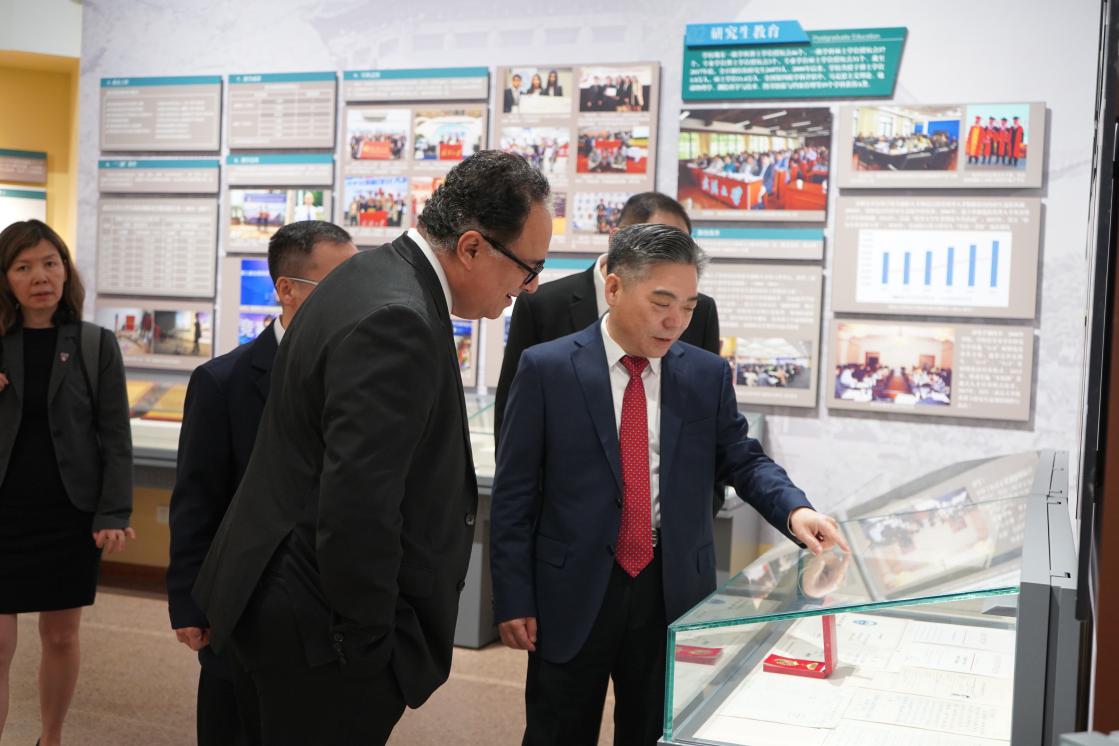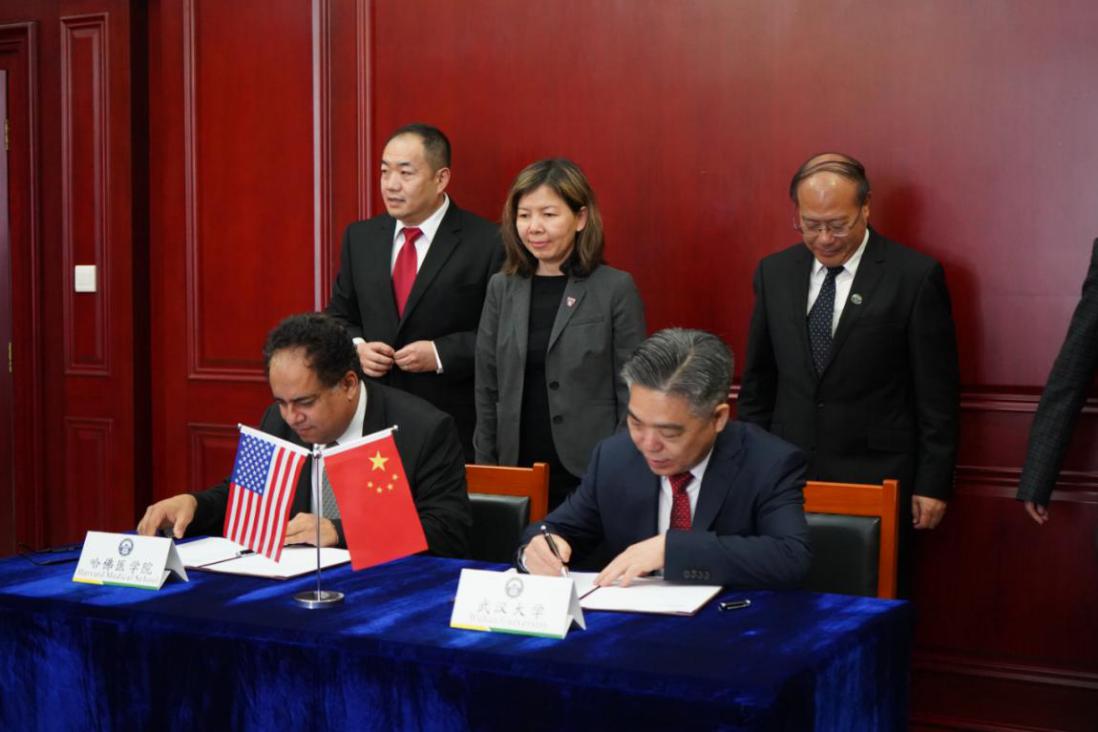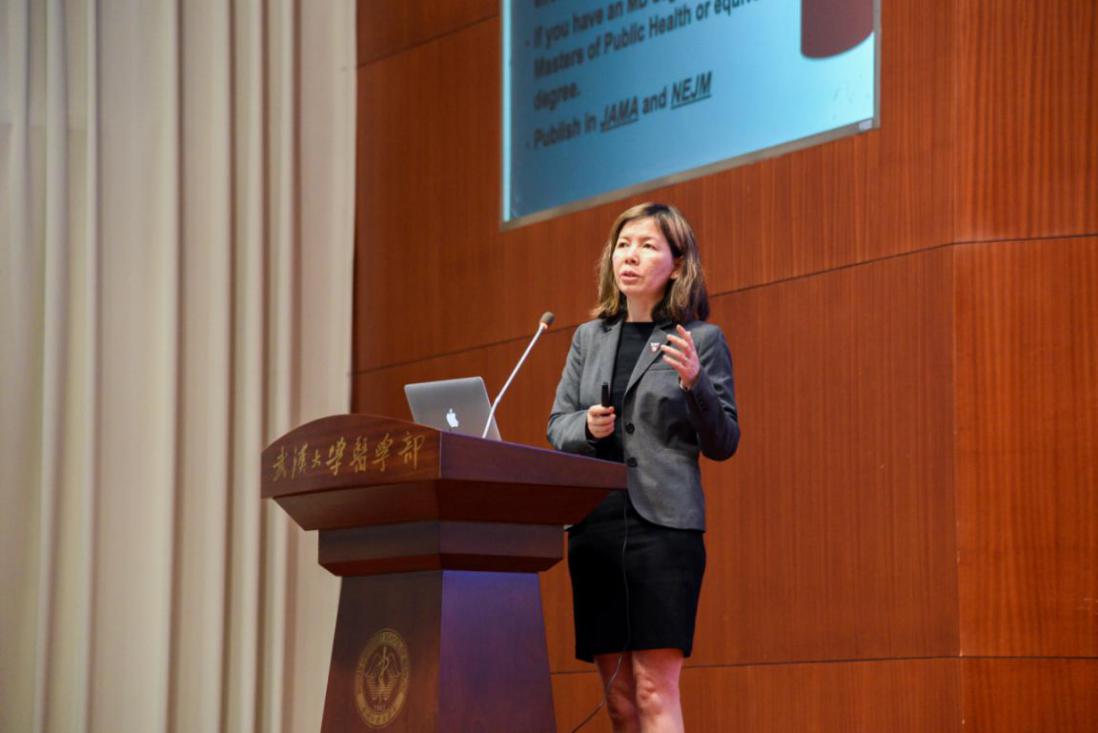Harvard Medical School delegation visits WHU
Oct 21, 2019 Clicks:
On October, 21st, the delegation from Harvard Medical School (HMS), led by Dr. Ajay Singh, Senior Associate Dean of Postgraduate Medical Education, Harvard Medical School, visited WHU. Two sides shared views on student exchange between two universities and signed cooperative agreements on two programs.
At 9:30, the HMS delegation arrived at the Exhibition Hall of WHU, accompanied by 5 representatives. The student guide introduced the history of WHU to them. They were then guided to the rooftop of the famous Cherry Blossom Castle, where they could have a bird’s eye view of the entire campus.

Vice President Tang (right) and Dr. Singh (left) at the Exhibition Hall
Afterwards, the signing ceremony was held at the No.1 Meeting room at Administration Buidling. Tang Qizhu, Vice President and Dean of Renmin Hospital of WHU, extended warm welcome to the guests. He said that WHU has established cooperative relations with lots of famous universities around the world, and is excited to collaborate with Harvard, a top ranking university. The cooperation is expected to produce excellent results of improving human health.
Dr. Singh cited the saying “if you teach a man to fish, he can always eat” to describe their hope of educating Chinese students of HMS who will return as medical specialists in China. He believed that the cooperation will enhance the information sharing and talent training of both universities. It was then firmly noted by Vice President Tang that affiliated hospitals of WHU have accumulated rich clinical experience through receiving thousands of patients each year, and database would be shared with Harvard Medical School.
Thereafter, Vice President Tang and Dr. Singh signed cooperative agreements on two programs, namely Global Clinical Scholars Research Training Program (GCSRT) and Master in Medical Sciences in Clinical Investigation (MMSCI).

Signing the cooperative agreements
In the afternoon, the HMS members delivered two lectures at Yubi Hall, No.8 Building, School of Medicine. Li li, co-director of the Training-to-Teacher (T2T)-China Program, HMS, delivered a speech on ‘How to become a translational researcher’. Translational medicine is a branch of medicine that bridges the benchside and the bedside. “Currently, a novel drug, device, or other medical intervention takes about 14 years and 2 billion dollars to develop, with failure rate exceeding 95%”, Dr. Li said. However, she described translational research risky but rewarding. The researchers “live on the bridge, love the view, and do not fear”. She also encouraged the young researchers, who are offered adequate support from the Chinese government and society, to find their passion and dig into it.

Dr. Li giving a lecture
Then Dr. Singh shared his opinions on ‘How to publish in high impact journals’. He pointed out that publishing in high impact journals not only brings reputation to the university, but also advances human health. The keys to publishing any study are identifying the gap, formulating a research question and establishing resource database and infrastructure, while being open to assistance and collaboration. Dr. Singh summarized it as IDEA, that is to say, a good study has to be innovative, well designed, well executed, applicable and generalizable. In the end, he introduced the two programs signed this morning to encourage students and teachers to join the programs and to increase knowledge and skill in clinical research and build their network.
Established in 1782, Harvard Medical School is the first-class medical school in the US, with a core mission of educating students and seeding the fields of science and medicine with inspirational researchers. The School has produced generations of skilled physicians whose lifelong work is to care for patients with compassion and integrity. Until now, WHU has sent over 100 teachers, students and doctors to study at HMS and its teaching hospitals.
Photo by Lin Yilan & Zhan Chaoyue
Edited by Wang Qian, Geng Jinwei and Hu Sijia
